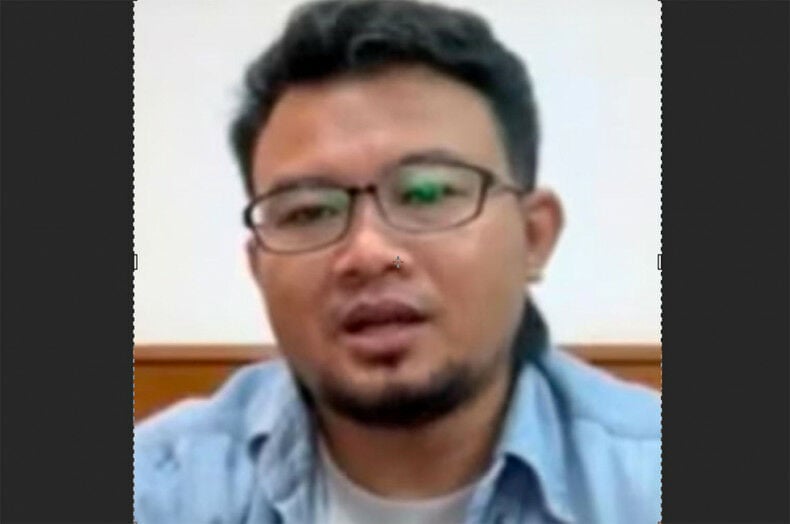NHRC urges Thai govt to stop deportation of Vietnamese activist

The National Human Rights Commission (NHRC) has urged the Thai government to halt plans to deport Vietnamese activist Y Quynh Bdap, expressing concerns for his safety.
Authorities arrested 32 year old Y Quynh Bdap in Bangkok this week. He is a prominent figure within the Montagnard ethnic group from Vietnam’s Central Highlands and co-founded Montagnards Stand for Justice, an organisation advocating for religious freedom. Christian Montagnards, particularly those affiliated with independent house churches, have faced persistent persecution by the Vietnamese government.
Living in Thailand since 2018, Bdap holds refugee status granted by the United Nations High Commissioner for Refugees (UNHCR). The Vietnamese government charged him with terrorism following riots in Dak Lak province in June last year, although his exact role in the unrest remains unclear.
Reports indicate that Bdap was taken into custody on Tuesday after meeting with Canadian authorities at their embassy in Bangkok to discuss his refugee status in Canada.
NHRC has intervened following a request from a civil society organisation to prevent Bdap’s deportation, arguing that he risks severe danger and an unfair trial if returned to Vietnam.
In a formal appeal to the Immigration Bureau, the commission emphasised adherence to the Prevention and Suppression of Torture and Enforced Disappearance Act 2022, which prohibits refoulement, the forcible return of individuals to countries where they may face persecution.
Thailand has international obligations under the International Covenant on Civil and Political Rights and the United Nations Convention Against Torture, both of which it is a signatory.
Human Rights Watch
Human Rights Watch (HRW) has echoed the NHRC’s call. Elaine Pearson, Asia director of HRW stated that Thailand needs to meet its obligations to protect refugees and demonstrate it deserves a seat on the United Nations Human Rights Council.
Thailand is currently campaigning for a seat on the United Nations Human Rights Council for the 2025 to 2027 term, with elections scheduled to take place in October at the UN headquarters in New York.
Mary Lawlor, UN Special Rapporteur on Human Rights Defenders, wrote in a post on X on Thursday that if Y Quynh Bdap is deported, Thailand would not be fit to be elected to the council.
HRW recently published a report criticising Thai authorities for aiding neighbouring governments in taking unlawful actions against refugees and dissidents, thus increasing risks for those fleeing persecution.
The report highlighted instances of transnational repression where foreign dissidents in Thailand have been traded for critics of the Thai government abroad, reported Bangkok Post.
ORIGINAL STORY: NHRC demands justice for nine missing Thai activists
The National Human Rights Commission (NHRC) called on the Ministry of Justice to take decisive action regarding the disappearance of nine Thai political activists who vanished after seeking asylum in neighbouring countries.
Sayamol Kaiyoorawong of the NHRC disclosed that she recently handed over an investigative report on these disappearances to Somboon Muangklam, adviser to Justice Minister Tawee Sodsong and chairman of the committee on the Prevention and Suppression of Torture and Enforced Disappearance. The report details the cases of activists who went missing in Laos, Cambodia, and Vietnam between 2017 and 2021.
The missing activists are Ittipon Sukpaen, Wuthipong Kochathamakun, Surachai Danwattananusorn, Chucheep Chiwasut, Kritsana Thapthai, Siam Theerawut, and Wanchalearm Satsaksit. Tragically, the bodies of Chatcharn Buppawan and Kraidej Luelert were discovered encased in concrete along the Mekong River border with Laos in late 2018.
All these individuals were either implicated under the Computer Crime Act, Section 112 of the Criminal Code, commonly known as the lese majeste law, or accused of actions undermining political stability. The NHRC criticised the Thai government for its lack of progress in investigating these cases, suggesting that state agencies might be implicated due to their negligence.
The NHRC’s investigation revealed that state agencies had failed to collaborate effectively with neighbouring countries to uncover the truth about the activists’ fates. The commission stressed the necessity for these agencies to follow legal procedures, determine the reasons behind the disappearances, and bring any responsible parties to justice.
The NHRC also emphasised the need for the government to compensate the families of the missing activists, as mandated by the International Convention for the Protection of All Persons from Enforced Disappearance and the Prevention and Suppression of Torture and Enforced Disappearance Act 2022.
The NHRC noted a gap in the Damages for the Injured Person and Compensation and Expenses for the Accused in Criminal Case Act 2001, which lacks criteria for government compensation in cases of enforced disappearance. Moreover, there was no evidence that state agencies had provided any other forms of compensation to the affected families.
“The findings show that the missing activists shared political views that differed from those of the government.”
The NHRC has also urged the Cabinet to expedite the ratification of the Optional Protocol to the Convention against Torture and Other Cruel, Inhuman, or Degrading Treatment or Punishment, reported Bangkok Post.
Latest Thailand News
Follow The Thaiger on Google News:


























